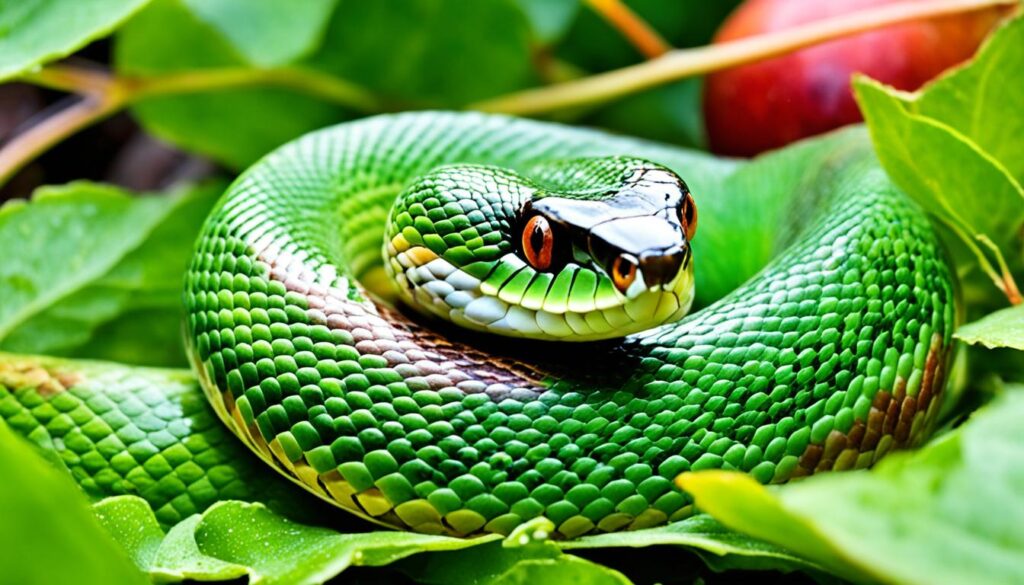Snakes are captivating animals with their own dietary needs. Many owners question if feeding apples to snakes is safe.
No, snakes do not eat apples as they are carnivorous by nature, meaning their diet consists entirely of meat. They primarily feed on live prey such as rodents, birds, eggs, and smaller reptiles. Snakes lack the proper digestive enzymes to break down plant matter, so fruits like apples are not a part of their natural diet.
Key Takeaways:
- Snakes have specific dietary needs and their natural diet varies depending on the species.
- Apples may not be suitable for snakes due to biological and digestive constraints.
- An improper diet can have short-term health issues and long-term consequences for snakes.
- Safe feeding practices, recommended foods, and consulting with a veterinarian are essential for snake care.
- Recognizing signs of nutritional deficiencies is crucial for maintaining snake health and well-being.
Basic Dietary Needs of Snakes
Understanding the dietary needs of snakes is essential for anyone interested in keeping these fascinating reptiles as pets or simply learning about their habits in the wild.
Snakes are obligate carnivores, which means their diet consists exclusively of meat. Here’s a deeper dive into what constitutes a typical diet for snakes and the specific nutrients they require to thrive.
Natural Diet of Snakes
In the wild, snakes’ diets vary widely depending on their species and the environment they inhabit.
Most snakes prey on other animals, and what they consume can range from small insects and fish to amphibians, birds, and mammals.
Larger snakes, such as pythons and anacondas, can consume prey as large as deer or pigs.
This natural predatory behavior is crucial for their survival, as it provides them with essential nutrients that are hard to replicate in captivity.
The method of consuming prey also varies among snake species. Some snakes, like the constrictors, squeeze their prey to death before swallowing it whole.
Others, such as vipers and cobras, inject venom to immobilize or kill their prey immediately.
This method of eating impacts the type of nutrients they absorb and how they process them, which is a key consideration for their dietary needs.
Nutritional Requirements
The primary component of a snake’s diet is protein, which is vital for their growth, repair, and overall health.
Snakes derive their proteins from the muscles and organs of their prey. Along with proteins, snakes also require a certain amount of fats, which they obtain from the natural body fat of their prey animals.
Fats are a crucial energy source, particularly for species that eat intermittently and rely on stored energy to survive periods without food.
In addition to macronutrients like protein and fat, snakes also need various micronutrients, including vitamins and minerals, which they typically receive from their diverse diet in the wild.
Calcium, for example, is a critical mineral for snakes, necessary for bone health and metabolic processes. For more information about the calcium requirements of snakes, read this article.
In captivity, ensuring a balanced diet that mimics their natural eating habits is essential to prevent nutritional deficiencies.
This often involves offering a variety of prey items that include bones and organs to mimic the nutritional profile they would get in the wild.
Vitamins are another important component of a snake’s diet. Vitamin A is particularly important for snakes, as a deficiency can lead to skin problems and other health issues.
B vitamins are also crucial, especially for their role in the metabolism of the food they consume.
Many snake owners and breeders use supplements to ensure that their pet snakes receive the necessary vitamins and minerals, but care must be taken to avoid over-supplementation, which can be just as harmful as a deficiency.
Understanding these dietary needs is fundamental for the proper care of snakes, whether in captivity or for the preservation of their species in the wild.
Adequate knowledge ensures that these intriguing reptiles can lead healthy, thriving lives under human care or in their natural habitats.
Can Snakes Eat Apples?
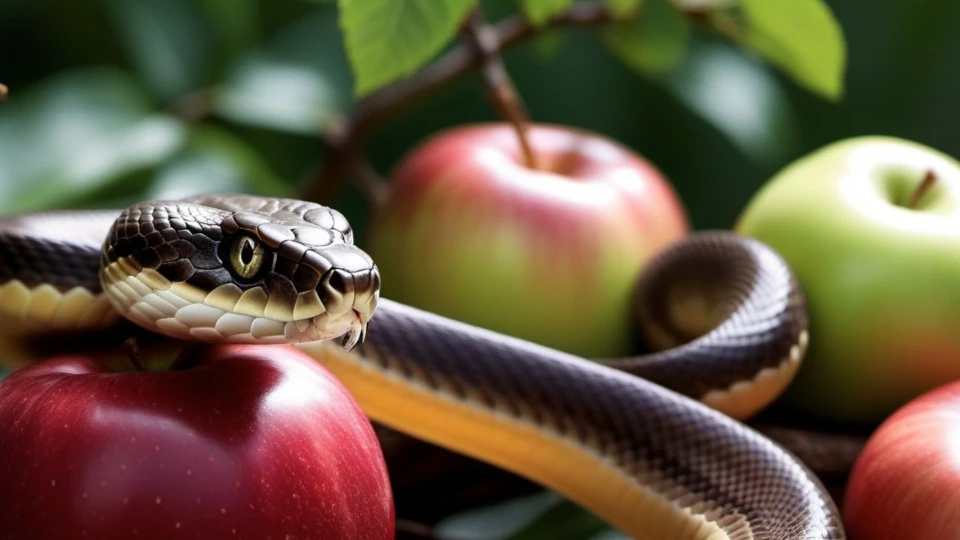
When it comes to the diet of snakes, it’s important to consider what is suitable and beneficial for their health based on their natural eating habits.
Snakes are carnivorous by nature, which means they primarily consume meat. The question of whether snakes can eat apples touches on several considerations regarding their biology and dietary needs.
Biological and Digestive Constraints
Snakes are specifically adapted to digest high-protein, high-fat diets derived from animal sources.
Their digestive systems are not designed to process or extract significant nutritional value from plant materials, such as fruits.
Snakes lack the necessary enzymes to break down plant matter, which means consuming apples or other fruits could not only provide no nutritional benefit but could also cause digestive distress.
The anatomy of a snake is another factor to consider. Their teeth are designed for gripping and holding onto prey rather than chewing, which is necessary for breaking down fibrous plant material like apples.
This biological adaptation further underscores that fruits are not a natural part of a snake’s diet and are unsuitable for them.
Risks of Feeding Apples to Snakes
Introducing apples or other fruits into a snake’s diet could lead to several health issues.
Firstly, the sugar content in apples, although natural, is much higher than anything a snake would encounter in its typical diet and can lead to obesity and other metabolic disorders.
Moreover, the acidity and other chemical components of apples might disrupt the snake’s digestion, leading to discomfort or more severe gastrointestinal issues.
Additionally, feeding snakes foods they cannot properly digest could lead to more serious complications like gastrointestinal blockage.
Such a condition is dangerous and could be potentially life-threatening, requiring veterinary intervention.
Also, feeding inappropriate food items like apples can lead to nutritional imbalances, as the snake spends energy trying to digest something from which it gains no real nutrients.
Given these points, it’s clear that snakes should not eat apples. Owners should adhere strictly to a diet that mimics a snake’s natural food intake, which primarily consists of appropriately sized, whole-prey items that provide complete nutrition.
This ensures the snake remains healthy, active, and free from diet-related health problems.
The Impact of an Improper Diet on Snakes
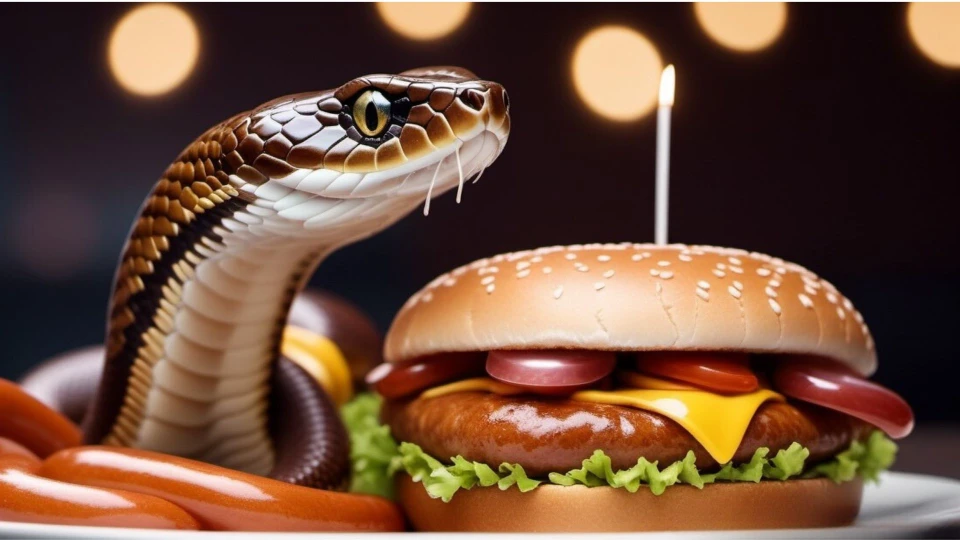
When it comes to feeding snakes, sticking to their natural diet isn’t just a recommendation—it’s a must for keeping them healthy and happy.
Let’s take a look at what happens when snakes are fed an improper diet and why it’s crucial to get their feeding regimen right.
Short-Term Health Issues
Feeding snakes foods that they aren’t built to digest, like fruits or vegetables, can lead to some pretty immediate and uncomfortable problems for your slithery friend.
For instance, foods high in sugar or complex carbohydrates can cause digestive upset in snakes, which aren’t equipped to handle these types of nutrients.
You might notice your snake is less active or has trouble digesting its food, which can lead to regurgitation—a messy and stressful experience for both you and your snake.
Another immediate issue could be nutritional imbalances. Snakes need a balanced diet, just like we do, but their balance looks different.
They thrive on a meat-based diet, and throwing in foods they can’t properly process means they’re not getting the right mix of nutrients.
This can lead to all sorts of health issues, including vitamin deficiencies and excess weight gain.
Long-Term Consequences
If a snake continues to eat the wrong kinds of food over a prolonged period, the stakes get even higher.
One of the major risks of a long-term improper diet is the development of metabolic diseases. Just like in humans, an unbalanced diet in snakes can lead to metabolic bone disease, which can make their bones weak and prone to fractures.
It’s a serious condition that can severely affect their quality of life and longevity.Another long-term risk is obesity.
Yes, snakes can get overweight, too! And while a chubby snake might sound kind of cute, obesity in snakes can lead to a host of health problems, including heart disease and diabetes.
Plus, an overweight snake can have reduced mobility and a lower quality of life.
Feeding your snake a proper diet might not be as straightforward as tossing a few fruits or veggies into a bowl, but it’s worth the effort.
Keeping to a diet that mirrors what they would eat in the wild—mostly whole prey like rodents—ensures that your snake not only survives but thrives.
So, let’s make sure we’re giving our scaly pals the best chance at a healthy life by sticking to the foods that are best suited to their unique biological needs.
Safe Feeding Practices for Pet Snakes
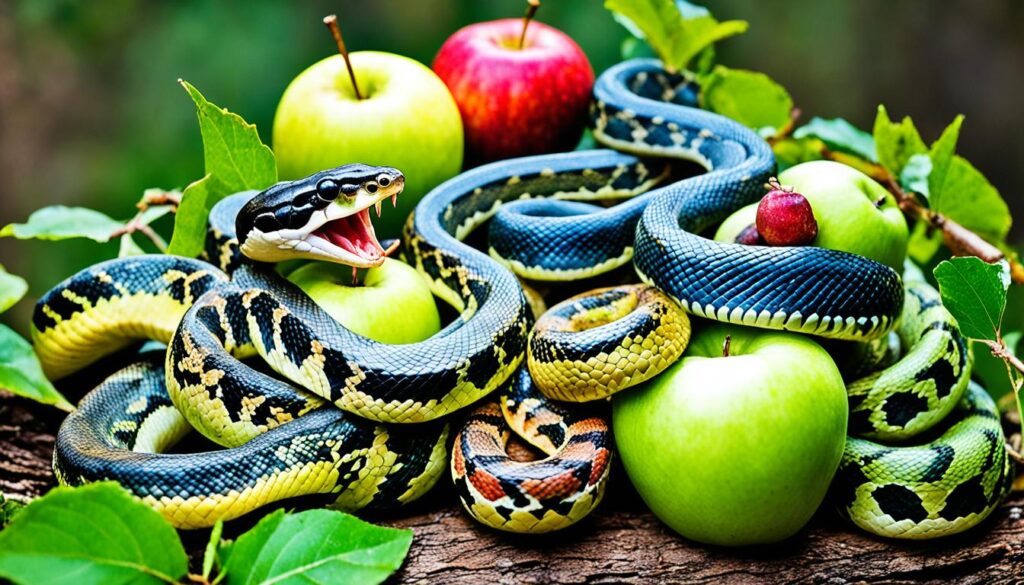
So, you’ve got a snake and you want to make sure it’s not just surviving, but thriving, right?
Let’s dive into some safe feeding practices that will keep your snake healthy and happy.
Remember, feeding your snake isn’t just about tossing food into its terrarium—it’s about making sure that food is the right kind, the right size, and given at the right frequency.
Recommended Foods for Snakes
First things first, let’s talk about what to feed your snake. The majority of pet snakes thrive on a diet of whole prey, such as mice, rats, or even rabbits, depending on the size of the snake.
These can be offered live or, for the safety of both the prey and your snake, frozen-thawed. Yes, frozen!
You can buy these at most pet stores, and they’re stored in the freezer. Just make sure you thaw them properly to room temperature before feeding time to avoid any digestive issues for your snake.
Now, while it might be tempting to try and mix things up for your snake with some variety, remember that snakes are not like dogs or cats.
They don’t need a diverse menu. Sticking to a consistent diet of rodents ensures they get the right balance of nutrients they need without the risks that come with more exotic or inappropriate foods.
Foods to Avoid
It’s equally important to know what not to feed your snake. As we discussed earlier, avoid fruits, vegetables, and any processed foods that humans might eat.
These can cause serious health problems for snakes. Also, steer clear of feeding your snake insects or fish unless specifically recommended by a vet or a care guide for your particular species of snake.
These types of food can lack the necessary nutrients and might even carry parasites.
If you’re unsure about a food item, talk to a reptile vet or an expert reptile keeper for advice.
For more on reptile care and the best pets for kids, visit petMD’s resource.
Feeding Frequency and Portion Size
How often should you feed your snake? Well, that depends on the snake’s age, size, and species. Younger, growing snakes typically need to eat more frequently—about once a week.
Adult snakes might only need a meal every two weeks or even once a month. The key is to observe your snake and adjust based on its behavior and health.
If your snake starts looking a bit chubby, it might be time to scale back on the frequency.
As for portion size, a good rule of thumb is that the prey item should not be wider than the snake’s body at its widest part.
This guideline helps prevent regurgitation and other digestive issues that can occur if the prey is too large.
By sticking to these safe feeding practices, you can ensure that your snake remains healthy and vigorous.
Expert Advice on Snake Care
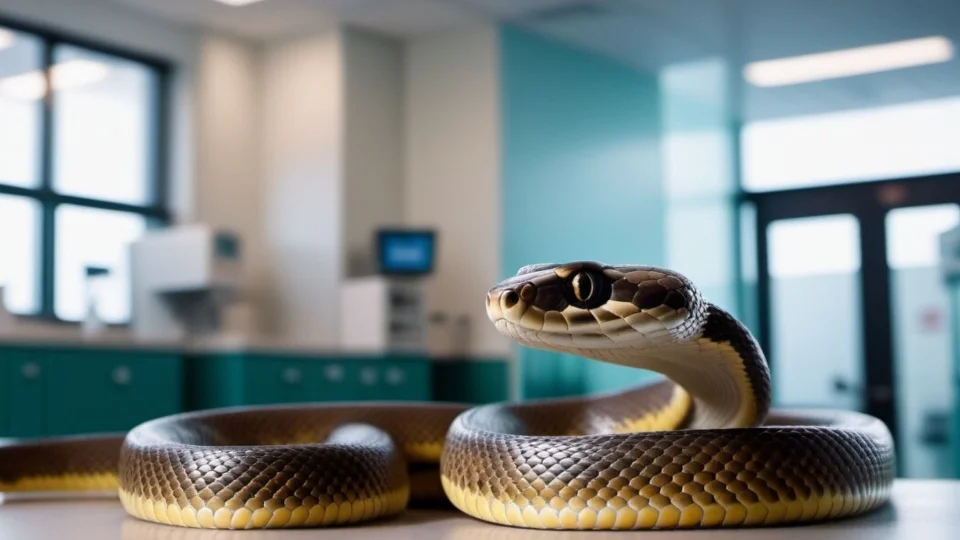
Alright, so you’ve got the basics of feeding your snake down, but let’s dive a bit deeper with some expert advice on snake care.
Whether you’re a seasoned snake owner or just starting out, it’s always good to have a few pro tips up your sleeve to make sure your slithery friend is living its best life.
Consulting with a Veterinarian
First thing’s first—finding a good reptile veterinarian is a game-changer for your snake’s health. Not all vets specialize in reptiles, so it’s worth seeking out one who does.
These experts can provide tailored advice based on the specific needs of your snake, from diet adjustments to health screenings.
Regular check-ups are a must to catch any potential health issues early, and a knowledgeable vet can also help you fine-tune your snake’s diet and habitat to prevent common problems.
Get advice from real veterinarians 24/7 by clicking here.
Signs of Nutritional Deficiencies
Being proactive about your snake’s health means keeping an eye out for signs that something might be off, especially when it comes to nutritional deficiencies.
Things like a lackluster appearance, lethargy, or difficulty shedding are red flags that your snake might not be getting all the nutrients it needs.
If your snake’s usually shiny scales start looking dull or it seems less active than normal, it might be time to revisit its diet or schedule a vet visit to rule out any underlying issues.
It’s also smart to watch how your snake eats. A healthy snake should show interest in its food and consume it without difficulty.
Trouble swallowing or disinterest in food can also indicate health problems that might need professional attention.
Creating an Optimal Environment
Beyond just what your snake eats, where and how it lives plays a huge part in its overall health.
Make sure your snake’s habitat is set up properly—with the right heat gradients, humidity, and hiding spots.
Snakes are sensitive to their environments, and getting these elements right can prevent stress and a host of health issues.
Regularly cleaning the enclosure, maintaining the correct temperature and humidity, and ensuring that your snake has a comfortable and secure hiding place are all critical components of good snake care.
Remember, caring for a snake is a commitment, and being attentive to the details of their health and environment can make all the difference.
Don’t hesitate to reach out to the experts, whether it’s your vet or experienced snake handlers, to get the best advice on how to care for your particular type of snake.
Conclusion
Caring for a snake involves more than just providing the right type of food; it’s about understanding and catering to the unique needs of these fascinating reptiles.
From their strictly carnivorous diet that excludes items like apples to the specific environmental conditions they require to thrive, every aspect of snake care is important.
Remember, snakes are not the typical pet and their care requires a specialized approach. Regular consultations with a reptile-savvy veterinarian, vigilant monitoring for signs of health issues, and maintaining an optimal living environment are all crucial steps to ensure your snake leads a healthy and happy life.
By sticking to the recommended dietary practices and being mindful of the common pitfalls of snake care, you can avoid many of the issues that new snake owners face.
Whether you’re a seasoned snake enthusiast or a curious beginner, continuously educating yourself about the latest best practices in reptile care can help you provide the best possible life for your slithery companion.
Snakes can be intriguing and rewarding pets when cared for properly, offering unique insights into the fascinating world of reptiles.
Frequently Asked Questions
Q: What should you not feed a snake?
You should not feed snakes anything that is not part of their natural diet. This includes processed foods meant for humans, fruits, vegetables, dairy products, and any cooked or seasoned meats.
Q: Can you give snakes fruit?
No, snakes should not be given fruit as they lack the digestive enzymes to properly break down plant matter. Snakes are obligate carnivores, which means their diet should consist of meat only.
Q: Why can’t snakes eat fruit?
Snakes can’t eat fruit because their digestive systems are not equipped to handle plant materials. They are evolved to consume and digest animal protein exclusively.
Q: What can snakes eat from human food?
Snakes should not eat human food. Their diet should consist of whole prey items such as rodents, birds, or insects, depending on the species of snake. These prey items should be provided in a form that mimics their natural diet, typically alive or frozen then thawed.
Q: Do snakes eat tomatoes?
No, snakes do not eat tomatoes or any other type of fruit or vegetable. Their diet is strictly carnivorous.
Q: Is it bad to feed your snake in its cage?
Feeding your snake in its cage is a common practice and not inherently bad. However, it can sometimes lead to cage aggression, where the snake associates the opening of the cage with feeding. To avoid this, some owners choose to feed their snake in a separate enclosure.
Q: How do you know when a snake is hungry?
Signs that a snake is hungry may include increased activity, more frequent tongue flicking, and attentiveness when you open the cage. Some snakes may also strike the glass when they are hungry.
Q: How often does a snake need to be fed?
The frequency of feeding depends on the age, species, and health of the snake. Juvenile snakes may eat twice a week, while adults typically eat once every one to two weeks. Very large species may eat even less frequently.


